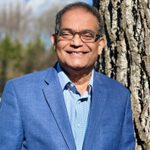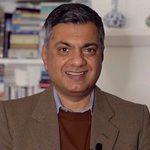Event Recording:
Join us for a roundtable discussion with Professor Amitav Acharya, Professor Faisal Devji, and Professor Andrew Hurrell, chaired by Professor Louise Fawcett.
Drawing on Acharya’s new book 'The Once and Future World Order: Why Global Civilization Will Survive the Decline of the West' which argues that world order is not the monopoly of any civilisation or nation, the panel will discuss three key questions: Firstly, has world order been a shared creation, as the book argues? Secondly, will the end of Western dominance be a “good or bad thing"; and thirdly, what might be the shape of the “next” world order - a return to multipolarity or bipolarity, a revival of US hegemony, a world order of regions, or a “multiplex” world?
This is a joint event with the Oxford Martin Programme on Changing Global Orders.
This event will be followed by a drinks reception, all welcome.
SPEAKERS AND PANELLISTS:
Amitav Acharya, UNESCO Chair in Transnational Challenges and Governance and Distinguished Professor at the School of International Service, American University, Washington DC
Louise Fawcett (Chair), Professor of International Relations and Co-Director of the Oxford Martin Programme on Changing Global Orders
Faisal Devji, Beit Professor of Global Imperial History, University of Oxford
Andrew Hurrell, Senior Research Fellow in International Relations, Balliol College, University of Oxford

Professor Amitav Acharya
UNESCO Chair in Transnational Challenges and Governance and Distinguished Professor at the School of International Service, American University, Washington, DC
Amitav's recent books include ‘The Once and Future World Order: Why Global Civilization Will Survive the Decline of the West’ (Basic Books 2025), ‘Constructing Global Order’ (Cambridge 2018); ‘The End of American World Order’ (Polity 2014, 2018) and ‘The Making of Global International Relations’ (Cambridge 2019: with Barry Buzan). His articles have appeared in International Organization, International Security, International Studies Quarterly, Foreign Affairs, Journal of Peace Research, International Affairs, Perspectives on Politics, and World Politics. A Past President of the International Studies Association (ISA), he is the winner of three ISA Distinguished Scholar Awards, that respectively cite his "contribution to non-Western IR theory and inclusion;” “influence, intellectual works and mentorship” in the field of international organisation; and “extraordinary impact” in globalising the study of International Relations.
Professor Louise Fawcett (Chair)
Professor of International Relations and Fellow of St Catherine’s College, University of Oxford. Co-Director, Oxford Martin Programme on Changing Global Orders
Louise works on comparative regionalism and the international relations of the Global South, particularly the Middle East. Her publications include ‘Iran and the Cold War’ (2009); ‘Regionalism in World Politics’ (with Andrew Hurrell, 1995); ‘The Third World Beyond the Cold War’ (2000, with Yezid Sayigh); ‘Regionalism and Governance in the Americas’ (2005, with Monica Serrano); ‘Interregionalism and the European Union’ (2015, with Mario Telò and Frederik Ponjaert); and ‘International Relations of the Middle East’, (6th edn 2023).
Professor Fawcett is on the editorial board of International Affairs and the Academic Advisory Board of the German Institute of Global and Area Studies (GIGA). In 2020 she was elected to the Belgian Royal Academy (Académie Royale de Belgique) as Associate Member. In 2025 she joined the Tokyo-based United Nations University Council.

Professor Faisal Devji
Beit Professor of Global and Imperial History at the University of Oxford
Faisal completed his PhD in Intellectual History at the University of Chicago in 1994. He was then elected Junior Fellow at the Harvard Society of Fellows, after which he went on to run the graduate program at the Institute of Ismaili Studies in London, which included schools in Tajikistan and Iran. Returning to regular academic life in 2003, he taught for two years at Yale as a visiting lecturer and another four at The New School for Social Research in New York as Associate Professor, arriving in Oxford as Reader in Modern South Asian History in 2009. His academic interests include the intellectual and political thought of modern South Asia as well as the emergence of Islam as a global category. He has also focussed on the cultural and philosophical meanings of violence as much as the emergence of non-violence as a political project. His recent works have dealt with efforts to think beyond the nation-state and the inheritance of anarchism in the post-colonial world.
Professor Andrew Hurrell
Senior Research Fellow in International Relations and Co-Director of the Oxford Martin Programme on Changing Global Orders
Andrew Hurrell was Montague Burton Professor of International Relations at Oxford University until May 2021. He is now a Senior Research Fellow in International Relations at Balliol College, an Einstein Visiting Fellow in Berlin, a Senior Fellow at the Law Faculty in Humboldt University, and Co-Director of the Oxford Martin Programme on Changing Global Orders. He was elected to the Johns Hopkins Society of Scholars in 2011 and to the British Academy in 2011. In 2015 he received the Susan Strange Prize from the International Studies Association, which is awarded for ‘challenging the conventional wisdom and organizational complacency of the international studies community’.
His academic career has been driven by two core intellectual concerns: one focused on the nature and possibilities of order in international life; the second on the changing global character of international politics and the contestation that has resulted from hierarchy and inequality on the one hand and value and cultural diversity on the other.
Keep in touch
If you found this page useful, sign up to our monthly digest of the latest news and events
Subscribe